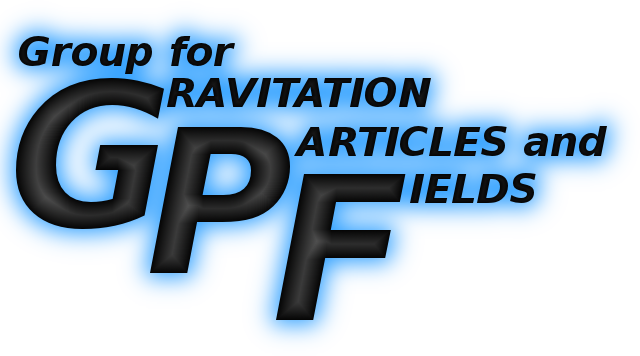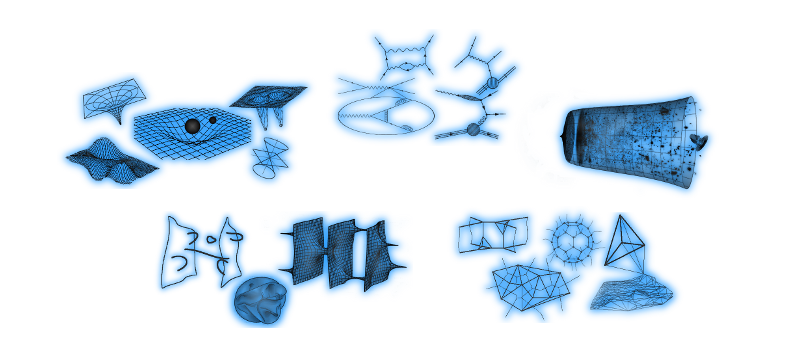


Seminars for the year:
2025
2024
2023
2022
2021
2020
2019
2018
2017
2016
2015
2014
2013
2012
2011
2010
2009
2008
2007
Follow our seminars online via: GPF BigBlueButton server
Time: 25. December 2015, 11:00h
Place: Institute of Physics, room 300
Speaker: Aleksandar Mikovic
Title: BF theory formulations of General Relativity
Abstract:
We review the BF theory formulations of General Relativity and discuss their relevance for the problem of constructing a quantum theory of gravity.
Time: 13. November 2015, 11:00h
Place: Institute of Physics, room 300
Speaker: Maja Buric
Title: Unitary irreducible representations of the SO(2,1) group
Abstract:
We will present two different approaches to study the properties of unitary irreducible representations of the SO(2,1) group. In the first approach one analyzes the Casimir operator algebra and the action of the raising and lowering operators, while in the second approach one starts from the so-called elementary representation of the algebra (which is not unitary in the case of SO(2,1)) and by using the direct product obtains the unitary irreducible representations.
Time: 16. October 2015, 11:00h
Place: Institute of Physics, room 300
Speaker: Dejan Simic
Title: Hawking's radiation
Abstract:
(tba)
Time: 2. October 2015, 11:00h
Place: Institute of Physics, room 300
Speaker: Marko Vojinovic
Title: Hamiltonian analysis of the BFCG theory for the Poincare 2-group
Abstract:
We perform the full Hamiltonian analysis of the topological BFCG action based on the Poincare 2-group. The Hamiltonian of the theory is constructed, and the algebra of constraints is computed. The Dirac brackets are evaluated, and the second class constraints are then eliminated from the theory. The results are contrasted to those of the topological Poincare gauge theory, which is equivalent to the BFCG model at the level of the classical action, but has a very different Hamiltonian structure. We find a singular canonical transformation connecting the two theories.
Time: 17. July 2015, 11:00h
Place: Faculty of Physics, room 661
Speaker: Djordje Minic
Title: Relative locality, metastring theory and modular spacetime
Abstract:
In this talk I will discuss the problem of formulating a sensible theory of quantum gravity by focusing on the central physical concepts such as locality and causality. Recently, we (L. Freidel, R. Leigh and Dj. M.) have considered a reformulation of string theory to confront these fundamental issues of quantum gravity. The resulting theory, called metastrings, leads to a new notion of quantum space-time that we call modular space-time, which also sheds new light on the foundations of quantum theory.
Time: 12. June 2015, 11:00h
Place: Institute of Physics, room 300
Speaker: Djordje Sijacki
Title: My view of elementary particle physics
Abstract:
We will give comments on quantum mechanics, special theory of relativity and supersymmetry from the aspect of group theory. Problems and generalizations of the Standard Model and unification of fundamental interactions of elementary particles will be discussed.
Time: 5. June 2015, 14:00h
Place: Institute of Physics, room 300
Speaker: Marko Vojinovic
Title: Covariant approach to quantum gravity (part 3)
Abstract:
The problem of quantization of gravity is one of the fundamental problems of modern theoretical physics. In the following three lectures we will describe the covariant method of quantization, based on the construction of the path integral for the gravitational field, and the spinfoam models emergent from the Loop Quantum Gravity program. The lectures are aimed at students, so the exposition of the material will be gradual, and we will assume only the most elementary knowledge of quantum field theory and general relativity.
The final, third lecture will be devoted to the notion of effective action. Effective action is a powerful tool for examining various properties of the quantum theory, especially nonperturbative effects. We will discuss the effective action first in quantum mechanics, then in quantum field theory, and finally in the context of state sum models of quantum gravity.
Time: 29. May 2015, 14:00h
Place: Institute of Physics, room 300
Speaker: Marko Vojinovic
Title: Covariant approach to quantum gravity (part 2)
Abstract:
The problem of quantization of gravity is one of the fundamental problems of modern theoretical physics. In the following three lectures we will describe the covariant method of quantization, based on the construction of the path integral for the gravitational field, and the spinfoam models emergent from the Loop Quantum Gravity program. The lectures are aimed at students, so the exposition of the material will be gradual, and we will assume only the most elementary knowledge of quantum field theory and general relativity.
In the second lecture we will define state-sum models as one possible rigorous definition of a path integral. We will study its relationship with the Feynman's definition of the path integral in quantum mechanics, with spinfoam models in covariant LQG, as well as the elements of lattice QCD. A short mention will be given also to TQFT's and the relationships with topological invariants of manifolds, Pachner's theorem, and the relationship between topological and physical quantum field theories.
Time: 29. May 2015, 11:00h
Place: Institute of Physics, room 300
Speaker: Marko Vojinovic
Title: Unexpected connections between the spincube model and two other QG models
Abstract:
We will discuss two interesting results related to the spincube model of quantum gravity. The first result is the connection between the constrained BFCG action and MacDowell-Mansouri action as the second-order theory. The second result represents the spincube model of QG as a generalization of the Causal Dynamical Triangulations approach to QG. This generalization is an unexpected and surprising result, given the structure of the Diophantine equations which relate the two theories.
Time: 22. May 2015, 14:00h
Place: Institute of Physics, room 300
Speaker: Marko Vojinovic
Title: Covariant approach to quantum gravity (part 1)
Abstract:
The problem of quantization of gravity is one of the fundamental problems of modern theoretical physics. In the following three lectures we will describe the covariant method of quantization, based on the construction of the path integral for the gravitational field, and the spinfoam models emergent from the Loop Quantum Gravity program. The lectures are aimed at students, so the exposition of the material will be gradual, and we will assume only the most elementary knowledge of quantum field theory and general relativity.
In the first lecture we will discuss the Regge model of general relativity, and establish a connection to the canonical LQG program, as an introduction to the construction of the path integral for the gravitational field.
Time: 22. May 2015, 11:00h
Place: Institute of Physics, room 300
Speaker: Athanasios Chatzistavrakidis
Title: An introduction to Courant algebroids with applications in physics
Abstract:
Modern methods of differential geometry, notably the theory of Lie and Courant algebroids, have found numerous applications in theoretical physics over the last years, including Yang-Mills theories, sigma models and string theory. These structures are instrumental in systematically formulating theories with different sets of degrees of freedom (for example gauge and scalar fields in field theories, or metric and Kalb-Ramond fields in string theory) and discussing generalized symmetries (for example algebroid gauge symmetries and T-duality). In this talk first we introduce the basic mathematical notions and discuss some examples. The main techniques that allow the construction of general classes of algebroid structures are presented. Then we shift our attention to three applications in physics: (a) the construction of generalized Yang-Mils theories on a particular type of Lie algebroids called Dirac structures, (b) a matrix model with SO(d,d) symmetry that provides an emergent picture for the dynamics of (non-commutative) phase space and (c) a class of sigma models providing a description of non-geometric backgrounds in string theory.
Time: 15. May 2015, 11:00h
Place: Institute of Physics, room 300
Speaker: Igor Salom
Title: Hyperspherical harmonics
Abstract:
We will begin with the discussion of (hyper)spherical harmonics and the integration over a (hyper)sphere in n dimensions. Then we will show how these general mathematical considerations and simple results lead to some advancements in two completely unrelated contexts: in affine theory of gravity on one hand, and in the nonrelativistic three-particle systems on the other. After that we will devote some more attention to the problem of determining the hyperspherical harmonics for the three-particle systems and the results which are implied for the bound states of three quarks.
Time: 17. April 2015, 11:00h
Place: Institute of Physics, room 300
Speaker: Branislav Sazdovic
Title: T-duality in closed-string theory (part 2)
Abstract:
We will consider three approaches to T-duality in the case of closed-string theory. Based on their authors, we will call them Buscher, Hull and Duff approaches. T-duality will be derived for different background fields: flat space, weakly curved space (up to first and second order), and type IIB supersymmetric space. We will show relationships between these approaches. In simpler cases we will derive characteristic properties of T-duality, that equations of motion are T-dual to Bianchi identities, and that Noether currents are T-dual to topological currents.
Time: 3. April 2015, 11:00h
Place: Institute of Physics, room 300
Speaker: Branislav Sazdovic
Title: T-duality in closed-string theory (part 1)
Abstract:
We will consider three approaches to T-duality in the case of closed-string theory. Based on their authors, we will call them Buscher, Hull and Duff approaches. T-duality will be derived for different background fields: flat space, weakly curved space (up to first and second order), and type IIB supersymmetric space. We will show relationships between these approaches. In simpler cases we will derive characteristic properties of T-duality, that equations of motion are T-dual to Bianchi identities, and that Noether currents are T-dual to topological currents.
Time: 27. March 2015, 11:00h
Place: Institute of Physics, room 300
Speaker: Aleksandar Mikovic
Title: Canonical quantization of 2-Poincare BFCG theories
Abstract:
We describe a canonical formulation of the Poincare BFCG theory, which is based on a simplified Dirac procedure. The canonical quantization of this theory is then performed by using the equivalence to the Poincare BF theory. Implications for canonical quantization of General Relativity are discussed.
Time: 6. March 2015, 11:00h
Place: Institute of Physics, room 300
Speaker: Dejan Simic
Title: Holographic renormalization is always possible (part 2)
Abstract:
We analyse holographic duality in the limit of classical field theory in a bulk. By imposing certain restrictions on the bulk, we obtain that the boundary theory can always be renormalized. The theorems proved in the paper apply to the all known examples of the gauge/gravity duality including (A)dS/CFT, AdS/BCFT, Higher spin holography, holography with Kaluza-Klein compactification etc. At the end we use physical arguments to show that our restrictions to the bulk are necessary.
Time: 27. February 2015, 11:00h
Place: Institute of Physics, room 300
Speaker: Dejan Simic
Title: Holographic renormalization is always possible (part 1)
Abstract:
We analyse holographic duality in the limit of classical field theory in a bulk. By imposing certain restrictions on the bulk, we obtain that the boundary theory can always be renormalized. The theorems proved in the paper apply to the all known examples of the gauge/gravity duality including (A)dS/CFT, AdS/BCFT, Higher spin holography, holography with Kaluza-Klein compactification etc. At the end we use physical arguments to show that our restrictions to the bulk are necessary.
Time: 13. February 2015, 11:00h
Place: Institute of Physics, room 300
Speaker: Maja Buric
Title: Minimal length uncertainty relations and some physical consequences
Abstract:
In the talk we will review the results of several papers, notably the work of Kempf, Mann and Mangan, who introduce a certain type of uncertainty relations with the consequence of minimal uncertainty for the measurement of length, and then also papers which discuss the implications of these results for Hawking radiation.
Seminars for the year:
2025
2024
2023
2022
2021
2020
2019
2018
2017
2016
2015
2014
2013
2012
2011
2010
2009
2008
2007
Follow our seminars online via: GPF BigBlueButton server